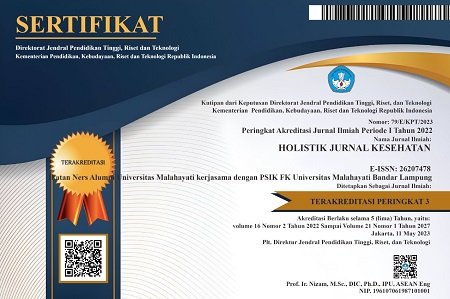Ketakutan terhadap Covid-19, agreeableness, dan neuroticism sebagai anteseden psychological distress selama pandemi Covid-19
Abstract
Background: Covid-19 is an infectious disease caused by the SARS-CoV-2 virus. On March 11 2020, the World Health Organization (WHO) officially declared Covid-19 a pandemic. In Indonesia, the first positive case was detected on March 2 2020. Covid-19 can cause several symptoms in infected individuals such as fever, cough, difficulty breathing, fatigue, loss of sense of smell and taste, headaches, etc. One of the psychological impacts caused by the Covid-19 pandemic is psychological distress. Psychological distress is an individual's emotional state when facing something that is perceived as threatening, which is characterized by depression and anxiety.
Purpose: To determine the effect of fear of Covid-19 and personality traits on psychological distress during the Covid-19 pandemic.
Method: Quantitative cross-sectional survey using a questionnaire as a means of collecting data. Respondents were obtained using convenience sampling, which is a non-probability sampling method that takes respondents who are easy to access. Respondent criteria are individuals who are at least 18 years old and express consent through informed consent. The research was conducted on 8 November - 2 December 2021 using Google forms which were distributed via various social media with 337 respondents.
Results: The average age of respondents in the study was 27.37 years with an SD value = 7.787, most of the respondents were in the 18-30 year age range, 264 people (78.3%). Fear of Covid-19 and neuroticism have a unidirectional influence on psychological distress, which means that the higher the fear of Covid-19 and the more dominant the individual's neuroticism personality, the higher the psychological distress felt during the Covid-19 pandemic. On the other hand, the agreeableness dimension has an inverse effect, so that the more dominant the individual's agreeable personality, the lower the psychological distress felt.
Conclusion: Fear of Covid-19, personality trait agreeableness, and personality trait neuroticism are factors that can predict individual psychological distress during the Covid-19 pandemic. Meanwhile, the personality traits extraversion, conscientiousness, and openness do not have a significant influence on psychological distress during the pandemic. Apart from that, demographic factors such as age, who the individual lives with, monthly income, and history of comorbidities can cause differences in levels of psychological distress.
Keywords: Covid-19; Fear; Neuroticism; Psychological Distress
Pendahuluan: Covid-19 merupakan penyakit menular yang disebabkan oleh virus SARS-CoV-2. Pada tanggal 11 Maret 2020, World Health Organization (WHO) resmi menetapkan Covid-19 sebagai sebuah pandemi. Di Indonesia, kasus positif yang pertama dideteksi pada tanggal 2 Maret 2020. Covid-19 dapat menimbulkan beberapa gejala pada individu yang terinfeksi seperti demam, batuk, kesulitan bernafas, kelelahan, kehilangan indera penciuman dan perasa, sakit kepala, dan lain-lain. Salah satu dampak psikologis yang diakibatkan oleh pandemi Covid-19 adalah psychological distress. Psychological distress merupakan keadaan emosi individu ketika menghadapi sesuatu yang dipersepsi mengancam, yang ditandai dengan depresi dan kecemasan.
Tujuan: Untuk mengetahui pengaruh dari ketakutan terhadap Covid-19 dan personality traits terhadap psychological distress selama pandemi Covid-19.
Metode: Penelitian kuantitatif survei cross-sectional dengan penggunaan kuesioner sebagai alat untuk mengumpulkan data. Responden diperoleh menggunakan convenience sampling yaitu metode sampling non-probabilitas mengambil responden yang mudah untuk diakses. Kriteria responden adalah individu yang sudah berusia minimal 18 tahun dan menyatakan persetujuan melalui informed consent. Penelitian dilakukan pada tanggal 8 November - 2 Desember 2021 menggunakan google forms yang disebarkan melalui berbagai media sosial dengan responden sebanyak 337 orang.
Hasil: Rata-rata usia responden pada penelitian adalah 27.37 tahun dengan nilai SD = 7.787, sebagian besar responden berada pada rentang usia 18-30 tahun sebanyak 264 orang (78.3%). Fear of Covid-19 dan neuroticism memiliki pengaruh yang searah terhadap psychological distress, yang artinya semakin tinggi ketakutan terhadap Covid-19 dan semakin dominan kepribadian neuroticism dari individu, semakin tinggi pula psychological distress yang dirasakan selama pandemi Covid-19. Sebaliknya, dimensi agreeableness memiliki pengaruh yang terbalik, sehingga semakin dominan kepribadian agreeableness dari individu, semakin rendah psychological distress yang dirasakan.
Simpulan: Ketakutan terhadap Covid-19, personality trait agreeableness, dan personality trait neuroticism merupakan faktor-faktor yang dapat memprediksi psychological distress individu selama pandemi Covid-19. Sedangkan personality trait extraversion, conscientiousness, dan openness tidak memiliki pengaruh yang signifikan terhadap psychological distress selama pandemi. Selain itu, faktor demografi seperti usia, dengan siapa individu tinggal, pendapatan per bulan, serta riwayat penyakit penyerta dapat menimbulkan perbedaan tingkat psychological distress.
Keywords
References
Ahorsu, D. K., Lin, C. Y., Imani, V., Saffari, M., Griffiths, M. D., & Pakpour, A. H. (2020). The fear of Covid-19 scale: development and initial validation. International journal of mental health and addiction, 1-9.
Al-Omiri, M. K., Alzoubi, I. A., Al Nazeh, A. A., Alomiri, A. K., Maswady, M. N., & Lynch, E. (2021). Covid-19 and personality: A cross-sectional multicenter study of the relationship between personality factors and Covid-19 related impacts, concerns, and behaviors. Frontiers in psychiatry, 12, 608730.
Bower, J. E., Radin, A., & Kuhlman, K. R. (2022). Psychoneuroimmunology in the time of Covid-19: Why neuro-immune interactions matter for mental and physical health. Behaviour Research and Therapy, 154, 104104.
Every-Palmer, S., Jenkins, M., Gendall, P., Hoek, J., Beaglehole, B., Bell, C. & Stanley, J. (2020). Psychological distress, anxiety, family violence, suicidality, and wellbeing in New Zealand during the Covid-19 lockdown: A cross-sectional study. PLoS one, 15(11), e0241658.
Fernandez, R. S., Crivelli, L., Guimet, N. M., Allegri, R. F., & Pedreira, M. E. (2020). Psychological distress associated with Covid-19 quarantine: Latent profile analysis, outcome prediction and mediation analysis. Journal of affective disorders, 277, 75-84.
Flesia, L., Monaro, M., Mazza, C., Fietta, V., Colicino, E., Segatto, B., & Roma, P. (2020). Predicting perceived stress related to the Covid-19 outbreak through stable psychological traits and machine learning models. Journal of clinical medicine, 9(10), 3350.
Horesh, D., Kapel Lev‐Ari, R., & Hasson‐Ohayon, I. (2020). Risk factors for psychological distress during the Covid-19 pandemic in Israel: Loneliness, age, gender, and health status play an important role. British journal of health psychology, 25(4), 925-933.
Khattak, S. R., Saeed, I., Rehman, S. U., & Fayaz, M. (2021). Impact of fear of Covid-19 pandemic on the mental health of nurses in Pakistan. Journal of Loss and Trauma, 26(5), 421-435.
Kroencke, L., Geukes, K., Utesch, T., Kuper, N., & Back, M. D. (2020). Neuroticism and emotional risk during the Covid-19 pandemic. Journal of research in personality, 89, 104038.
Labrague, L. J., & de Los Santos, J. A. A. (2021). Fear of Covid‐19, psychological distress, work satisfaction and turnover intention among frontline nurses. Journal of nursing management, 29(3), 395-403.
Lee, S. A., & Crunk, E. A. (2022). Fear and psychopathology during the Covid-19 crisis: neuroticism, hypochondriasis, reassurance-seeking, and coronaphobia as fear factors. OMEGA-Journal of Death and Dying, 85(2), 483-496.
Li, M., Ahmed, M. Z., Hiramoni, F. A., Zhou, A., Ahmed, O., & Griffiths, M. D. (2021). Mental health and personality traits during Covid-19 in China: a latent profile analysis. International journal of environmental research and public health, 18(16), 8693.
Necho, M., Tsehay, M., Birkie, M., Biset, G., & Tadesse, E. (2021). Prevalence of anxiety, depression, and psychological distress among the general population during the Covid-19 pandemic: A systematic review and meta-analysis. International Journal of Social Psychiatry, 67(7), 892-906.
Nikcevic, A. V., Marino, C., Kolubinski, D. C., Leach, D., & Spada, M. M. (2021). Modelling the contribution of the Big Five personality traits, health anxiety, and Covid-19 psychological distress to generalised anxiety and depressive symptoms during the Covid-19 pandemic. Journal of affective disorders, 279, 578-584.
Olapegba, P. O., Chovwen, C. O., Ayandele, O., & Ramos-Vera, C. (2022). Fear of Covid-19 and preventive health behavior: Mediating role of post-traumatic stress symptomology and psychological distress. International journal of mental health and addiction, 20(5), 2922-2933.
Prout, T. A., Zilcha-Mano, S., Aafjes-van Doorn, K., Bekes, V., Christman-Cohen, I., Whistler, K., & Di Giuseppe, M. (2020). Identifying predictors of psychological distress during Covid-19: a machine learning approach. Frontiers in Psychology, 11, 586202.
Ramdhani, N. (2012). Adaptasi Bahasa dan budaya dari skala kepribadian big five. Jurnal psikologi, 39(2), 189-205.
Reizer, A., Koslowsky, M., & Geffen, L. (2020). Living in fear: The relationship between fear of Covid-19, distress, health, and marital satisfaction among Israeli women. Health Care for Women International, 41(11-12), 1273-1293.
Ross, C. E., & Mirowsky, J. (2003). Social structure and psychological functioning: Distress, perceived control, and trust. In Handbook of social psychology (pp. 411-447). Boston, MA: Springer Us.
Sathe, H. S., Mishra, K. K., Saraf, A. S., & John, S. (2020). A cross-sectional study of psychological distress and fear of Covid-19 in the general population of India during lockdown. Annals of Indian Psychiatry, 4(2), 181-189.
Satici, B., Gocet-Tekin, E., Deniz, M. E., & Satici, S. A. (2021). Adaptation of the Fear of Covid-19 Scale: Its association with psychological distress and life satisfaction in Turkey. International journal of mental health and addiction, 19, 1980-1988.
Serafini, G., Parmigiani, B., Amerio, A., Aguglia, A., Sher, L., & Amore, M. (2020). The psychological impact of Covid-19 on the mental health in the general population. QJM: An International Journal of Medicine, 113(8), 531–537.
Stanton, R., To, Q. G., Khalesi, S., Williams, S. L., Alley, S. J., Thwaite, T. L. & Vandelanotte, C. (2020). Depression, anxiety and stress during Covid-19: associations with changes in physical activity, sleep, tobacco and alcohol use in Australian adults. International journal of environmental research and public health, 17(11), 4065
Varshney, M., Parel, J. T., Raizada, N., & Sarin, S. K. (2020). Initial psychological impact of Covid-19 and its correlates in Indian Community: An online (FEEL-COVID) survey. PloS one, 15(5), e0233874.
Wang, Y., Kala, M. P., & Jafar, T. H. (2020). Factors associated with psychological distress during the coronavirus disease 2019 (Covid-19) pandemic on the predominantly general population: A systematic review and meta-analysis. PloS one, 15(12), e0244630.
Widyaningrum, A., Febriani, C. A., & Yanti, D. E. (2022). Faktor – faktor yang memengaruhi tingkat stress pada perawat saat pandemi Covid 19. Holistik Jurnal Kesehatan, 16(5), 382–395.
DOI: https://doi.org/10.33024/hjk.v17i5.10420
Refbacks
- There are currently no refbacks.
Copyright (c) 2023 Holistik Jurnal Kesehatan

This work is licensed under a Creative Commons Attribution-NonCommercial 4.0 International License.














